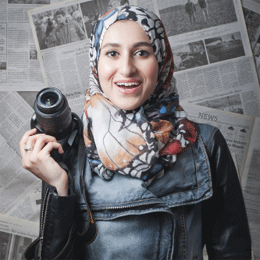
Some would say this began after 9/11, but this perception of Muslims and Islam has been heightened after recent violent attacks including the November 2015 Paris “act of war” orchestrated by the Islamic State (IS) militant group, which left 130 dead and many more wounded.
Next, in December 2015 in San Bernardino, Calif., 14 people were killed and 21 injured after the Inland Regional Center mass shooting at the hands of a couple with Pakistani heritage. Meanwhile, in what could be considered an act of retaliation, a severed pig’s head was left at the door of the Al-Aqsa Islamic Society in Philadelphia. Today, the rhetoric toward Muslims and Islam includes terms like violent, extremists and radicalized.
In a means to awaken the eyes that have been narrowed by this fear and animosity, Gene Klein, a Holocaust survivor, recently penned an open letter explaining that this political rhetoric—currently aimed at both Muslims, Islam and Syrian refugees—is reminiscent of the anti-Semitic language used in 1930s Germany prior to the Holocaust.
In an attempt to hear the voices of this small, yet growing community of Muslim Americans, South Jersey Magazine spoke to various leaders and residents who practice Islam and are eager to explain their religion’s similarities or differences and, most importantly, remind their neighbors that they’re American citizens who consider this country home.
COMMON MISCONCEPTIONS
In recent years, the name of Islam and what it means to be Muslim has, in some way, been lost in translation. Today, any act of terror committed has inspired the local community to become more vocal—not as a means to defend, but to explain that these acts do not represent their religion.
Imam Morshad Saami Hossain of the Voorhees Islamic Center, Muslim American Community Association (MACA) brings things back to basics, or as some would call it, Islam 101. “With this kind of rhetoric of violence and hate, it’s not making it very clear,” he explains. “When I say Islam, I mean our holy book, our holy scripture, the Quran. ... We don’t have a central figure that speaks [on] behalf of all Muslims. The consensus is that the Quran is the primary authority of Muslim beliefs and the Quran makes it very clear that a single innocent person who has been killed, it’s as though [you’re] killing the entire humanity.
“I don’t think there is anything more to say after that’s said, that killing a single person [is] unjust. That makes it very clear [on what] our stance as Muslims is supposed to [be] and what Islam dictates as far as harming innocent people are concerned.”
When it comes to practicing Islam, Imam Morshad further explains that the religion “teaches a person to be optimistic, it teaches a person to be humble, it teaches us to be well-mannered, and it teaches us to be caring, people of service.” Lastly, he adds, “People are unaware of the fact that Muslims come in all shapes and colors. …[It] is not exclusive to a certain race or ethnicity.”
Most common misconceptions, according to Imam Morshad, are more often than not directed toward Muslim women—especially those who wear a hijab (or headscarf). “Usually it’s a preconceived notion that if a woman covers her hair with a scarf, then she may not be educated or she may not speak English, or they must be un-American, forced or coerced by their male guardians or husbands to cover up like that,” he says.
While many may mistakenly view a headscarf as a sign of oppression, Muslim women who wear a hijab say it represents their identity and surprisingly enough—or not surprising at all—they are proud of it.
“I can’t blame them because … the only image you’ll see of a Muslim woman in the media is a woman that’s completely wearing all black [and] maybe she looks upset,” says Rowan University student and FOX 29 junior reporter, Zara Asad, who is often asked if she was forced to wear a headscarf. “It’s always such a negative image, so when they see people like me, or young Muslim girls, they are very surprised and we can see the surprise on their face.”
According to one area Muslim, the media and Hollywood also add to the misconceptions, whether they mean to or not. “When was the last time I could remember seeing an Arab or Muslim character on TV … who didn’t have anything to do with the war on terror?” asks 32-year-old Amin Baidouri of Turnersville. “There’s a very false perception that people have because they haven’t been exposed to anything else.”
All of these perceptions soon filter their way down to the news. “Before information comes out of who did the attack or before we have all the facts, they’re dubbed as a terrorist,” says Asad. “Even before dubbed a terrorist, our religion is attacked, [saying], ‘This is something that they all practice in [the] mosque.’ No, the last conversation I had in a mosque was about Justin Bieber.”
Moreover, culture and religion are also hard to decipher, something Asad says Muslims tend to blur. “What I say to the Muslim community is stop mixing your culture with your religion. For example, Northern Pakistani culture doesn’t send girls to school, that is not Islam. If someone in a village in Morocco is forcing his wife to wear something, that is his culture. That is not our religion,” she explains.
CONFRONTING ISLAMOPHOBIA
A mutual understanding is something Muslim Americans hope their non-Muslim counterparts can have. However, as Imam Morshad tries to bridge the gap between communities, he also encourages his own congregation to start by educating themselves first and foremost.
“We don’t know how to defend our own religion. We are no longer representing our own religion because we are not educated,” he states. “Every individual is required to learn about what Islam says, teach it to their children and really show everyone through their actions, what Islam is supposed to be.
“There will always be people that will say negative things and negativity will always be there. As long as we’re not willing to change our lives [and] focus on our fear of influence, which is ourselves and our direct community, there’s really no point in hoping for the external factors to change,” he counters. “It’s really a matter of us taking responsibility and a willingness to manage and transform ourselves through education in a positive and progressive manner.”
That point is two-fold, however, as fellow Muslims say the change can happen once the non-Muslim community has a better understanding of Islam. A Pew Research survey from 2010 revealed that most Americans know little or nothing of Islam, with just 9 percent of the population being well-informed.
“There is a huge bias against us and people love to say Muslims never speak out, but yet we’re never, ever given any platforms to speak out on,” says the 23-year-old Asad, who uses her blog and YouTube page—along with speaking at numerous events about the American Muslim identity—as a means of propelling her voice into the social stratosphere. “The best way we can combat them is educate people through our actions and through our character.”
Baidouri, who moved to Cherry Hill by way of Morocco in 1994, echoes Asad’s sentiments adding, “The more knowledgeable a person is about something, the better judgment they’ll make of it. I believe if people knew what Islam, what Arab, what the difference is between this and that, if they knew the history and the actual religion, they would not be so afraid of it.”
Many Muslims are also frustrated and saddened by it all simply because America has been their home for years—with some, like Imam Niaz, having been born here.
“We came here to get educated and we decided to stay here [because of] the fact that we liked the environment, we liked the country and we liked how we are treated here,” explains Owais Lari, who is a member of the board of trustees for the Islamic Center of South Jersey. “We made it our home and this is how we’ve been living all along.”
His wife, Mona, adds, “We have given so much to this community, to America; nobody has the right to tell us to leave this place. We have made this our home and we are staying.”
When it comes to ISIS and other hateful entities, Lari explains, “They have nothing to do with Islam and they are doing everything contradictory to what the religion is about and giving [it] a bad name.” He adds that Muslims are just as much victims as non-Muslims are. “They have killed more Muslims than any other people of any other religion.
“One of [ISIS’] agendas is that they want Muslims to be stigmatized and so in turn, hate will come of it and it will help their agenda, and that’s what concerns me. We should not play in the hands of ISIS with reacting to hate with hate. … Hate is far more contagious than love.”
LOCALS ON STEREOTYPING
Much of the older generation—who immigrated to the Unites States for the sake of bettering themselves in the early ’70s through the ’90s—didn’t experience much of what the youth is facing today. In fact, they found—and still do—America to be a welcoming country, especially right here in the Garden State.
“The state of New Jersey is a very diverse place with peoples of all backgrounds and cultures calling it their home,” proclaims John Starling, imam and director at Cherry Hill’s Gracious Center of Learning & Enrichment Activities (GCLEA). “It’s a very welcoming place and the local government agencies here put great effort into promoting an environment of tolerance and understanding. The people of South Jersey … are well informed and do not give into sensationalism.”
But discrimination on a youth level is still alive and well. “It’s hard going out there and our youth are scared. They’re so scared to just accept their identity more than ever,” laments Asad. “When I was younger and going through high school, I was scared, so I can’t imagine what they’re going through.”
In fact, racial profiling and slurs are often used in social settings especially in schools—which can often lead to physical altercations. “Raising three children in this environment is new for me—not that I’m a mother for the first time or anything,” says Saima Bhutta of Moorestown, whose son has been called a terrorist in the past. “My kids go to a very good school system and I never thought that they would ever have racism, but unfortunately, [my one son] was faced with that. He never talks about it because it wasn’t a great experience.”
It’s also worth noting that this stereotyping is just as prevalent abroad. Take Asad’s older sister Fatima, 26, a freelance journalist and mentor/coach for women and teenage girls, for instance. After being raised in Moorestown since age 9, she now lives in Pakistan with her husband and their two daughters, and continues to face stereotyping there as well. “Wearing a hijab in America was never a problem for me and I’ve always felt accepted and respected. In Pakistan, culture and religion are often mixed to such an extent that separating the two is impossible,” she explains. “The liberal Pakistanis would question my decision to cover up my head, while the conservatives would question my American loyalty.”
She also shares the same fears American Muslim mothers have today. “Every decision I make, [I] take my children’s future into account. I never want them to be bullied or feel out of place,” she explains, adding, “The challenge is, how do I teach my children to not only survive, but thrive in this often confusing world?”
MAKING A CHANGE
With discriminatory issues happening across the country, action has already been taken locally—specifically in Camden County, where the Freeholder Board recently approved a resolution stating their support of the Muslim community and condemning hate speech. “The political rhetoric went beyond the normal plight in politics and it got into language that reflected on an entire religion,” explains Freeholder Jeffrey Nash.
“The county thought it was very important [to] make a statement in support of the Muslim community and we understand the extremists who have hijacked the religion are not reflecting the views of an entire group of very loyal Americans.”
The resolution wasn’t without a bit of backlash though, as some locals felt the measure was possibly putting residents at risk. “When the county issued its resolution, I received several calls of some angry people saying, ‘You’re catering to the terrorists and aren’t you concerned about safety?’ And my answer is, obviously I’m not catering to any terrorist or anyone who is involved in any illegal activity and the Muslims in our community are not terrorists and safety is always our priority in Camden County,” says Nash.
What’s more, the MACA, along with the Jewish Catholic Muslim Dialogue, the Board of Freeholders and the Jewish Community Relations Council of Southern New Jersey stood in solidarity and held a forum this past February, to discuss the extremism, radicalization and Islam. As a result, over 500 people showed up.
“To have a response like that reflected the curiosity of the community about what extremism means and how it relates, if at all, to Islam and the response was overwhelming,” Nash adds. Of course, the event wasn’t without negative feedback as some attendees openly made anti-Muslim remarks during what was designed to be a question and answer forum. “It’s a reminder that even with education and understanding, there will be people who foster hate.
“This is not about the Muslim religion; these are about people who are bent on destruction for their own personal reasons and it’s nothing to do with Islam, in my view, and that’s why the forum was so important because it explained that to people. People don’t know what the religion entails. It’s not about violence, it’s not about killing, it’s about peace and love.”
On an interfaith level, Pope Francis has also spoken out reminding those willing to listen, that instead of building walls, we need to build bridges. To that, the Muslim Americans agreed and now, more than ever, they are speaking out, opening their doors and engaging in all forms of communication.
The Muslim community—especially here in South Jersey—wants to help others understand their point of view and their true stereotypes. “We are law-abiding citizens. We are your doctors, your teachers, lawyers, plumbers,” says Asad. “To push us into this one light, it’s unacceptable.”
Published (and copyrighted) in South Jersey Magazine, Volume 12, Issue 12 (March, 2016).
For more info on South Jersey Magazine, click here.
To subscribe to South Jersey Magazine, click here.
To advertise in South Jersey Magazine, click here.












